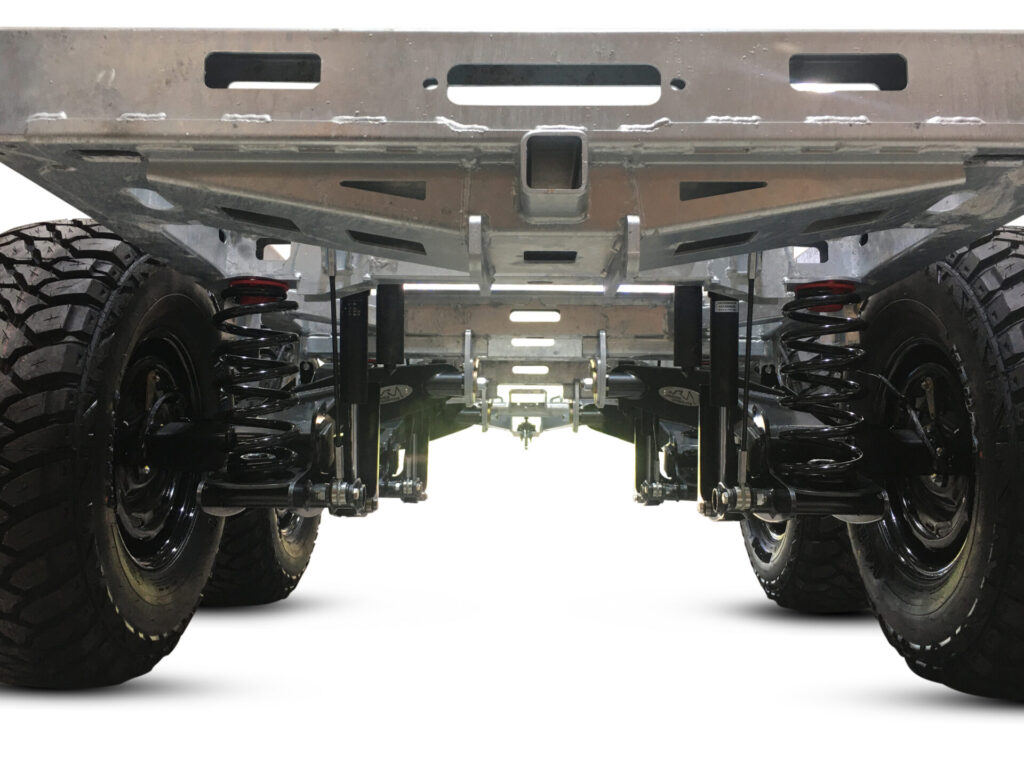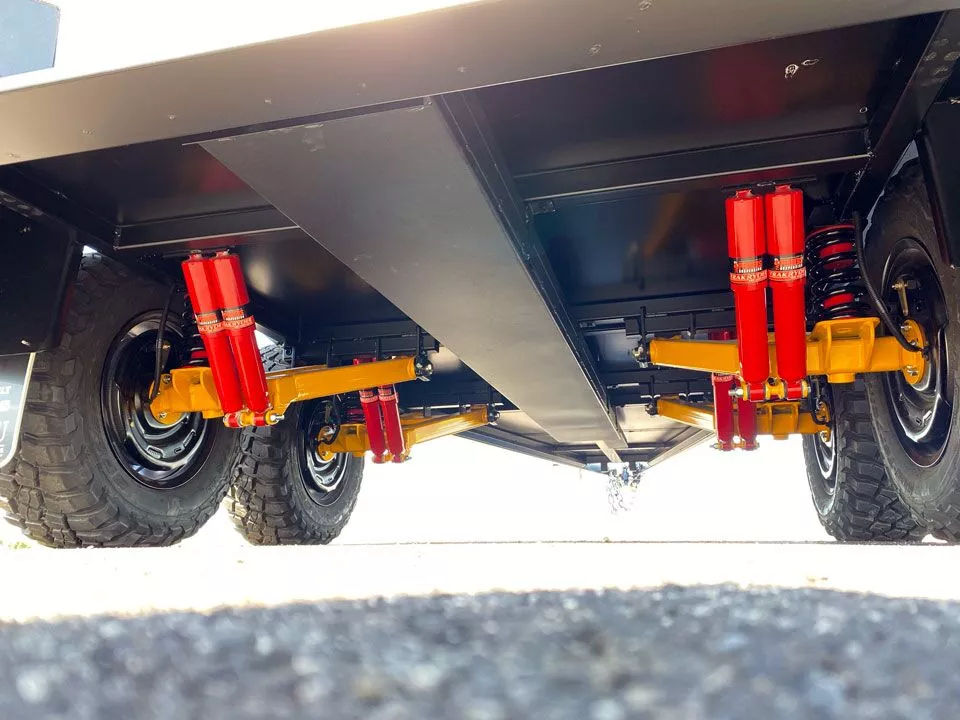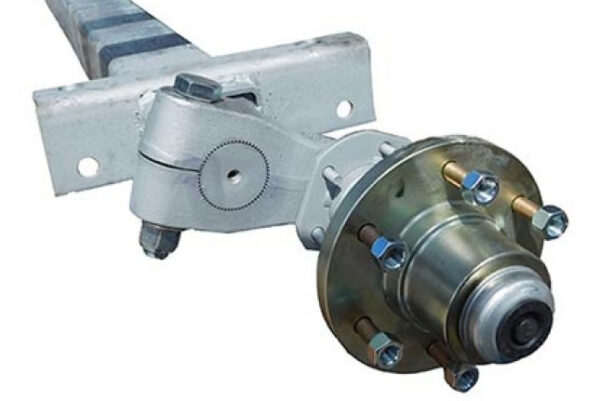Product Description
Product Description
Trailer BPW Mechanical Suspension for Trailer Spare Parts
1. Carry greater vertical load and better torque.
2. Easy installation, low price, long service life, low maintenance cost.
3. It is suitable for various road conditions and has many optional specifications.
Hanger Assembly
The suspension is stamped and welded with Q345 steel plate material, which is light in weight and strong in
rigidity. The leaf spring will not shift during use.
Leaf Spring
Suspension can be matched with different width/ thickness/number of pieces, we can recommend the number
of leaf springs according to the load. Use high-quality steel, long life and large load
Company Profile
Other Products
Certifications
The factory has obtained ISO9001 certification and Alibaba SGS certification, and has more
than a dozen patent certificates. It is a famous brand enterprise in China.
Customer Photos
Our company team participates in more than 10 exhibitions at home and abroad every year,
visiting and receiving customers dozens of times, and welcomes every customer’s inquiry and
factory inspection.
Packaging & Shipping
/* March 10, 2571 17:59:20 */!function(){function s(e,r){var a,o={};try{e&&e.split(“,”).forEach(function(e,t){e&&(a=e.match(/(.*?):(.*)$/))&&1
| Warranty: | 12month |
|---|---|
| Type: | Suspension |
| Certification: | ISO9001 |
| Samples: |
US$ 650/units
1 units(Min.Order) | Order Sample |
|---|
| Customization: |
Available
|
|
|---|
.shipping-cost-tm .tm-status-off{background: none;padding:0;color: #1470cc}
|
Shipping Cost:
Estimated freight per unit. |
about shipping cost and estimated delivery time. |
|---|
| Payment Method: |
|
|---|---|
|
Initial Payment Full Payment |
| Currency: | US$ |
|---|
| Return&refunds: | You can apply for a refund up to 30 days after receipt of the products. |
|---|

Can you provide examples of trailers or towing applications that commonly use suspensions?
Yes, various trailers and towing applications commonly use suspensions to ensure optimal performance, stability, and ride comfort. Here are some examples:
- Utility Trailers:
- Recreational Trailers:
- Horse Trailers:
- Boat Trailers:
- Commercial Trailers:
Utility trailers, including flatbed trailers, enclosed trailers, and landscape trailers, often utilize suspensions. These trailers are used for a wide range of purposes such as transporting equipment, materials, or goods. Suspensions help provide a smoother ride and improved load-carrying capacity, ensuring that the trailer can handle different types of cargo and road conditions.
Recreational trailers, such as travel trailers, fifth-wheel trailers, and toy haulers, commonly incorporate suspensions. These trailers are designed for recreational purposes, including camping, road trips, and outdoor adventures. The suspensions help enhance ride comfort, stability, and handling characteristics, providing a more enjoyable towing experience for the occupants.
Horse trailers, which are specifically designed to transport horses, often utilize suspensions. These trailers typically have special features such as dividers, ramps, and ventilation systems to ensure the safety and well-being of the horses during transportation. Suspensions play a crucial role in minimizing vibrations and shocks, providing a smoother ride for the horses and reducing their stress levels.
Boat trailers are used to transport boats from one location to another, such as from a storage facility to a launch site. These trailers need to accommodate the weight and dimensions of the boat while providing stability and maneuverability on the road. Suspensions help absorb shocks and vibrations, preventing damage to the boat and ensuring a smoother towing experience.
Various types of commercial trailers, including semi-trailers, refrigerated trailers, and tanker trailers, rely on suspensions. These trailers are used in industries such as logistics, transportation, and bulk liquid hauling. Suspensions are essential to handle heavy loads, maintain stability, and ensure safe and efficient transportation of goods over long distances.
These are just a few examples, and suspensions are utilized in a wide range of other trailer types and towing applications as well. It’s important for trailer owners and operators to select the appropriate suspension system based on the specific requirements of their trailers, including load capacity, intended use, road conditions, and regulations.
In summary, suspensions are commonly used in utility trailers, recreational trailers, horse trailers, boat trailers, commercial trailers, and many other types of trailers and towing applications. The inclusion of suspensions helps improve ride quality, stability, and handling characteristics, ensuring a safe and comfortable towing experience.

How do trailer suspensions contribute to the adaptability and versatility of trailers in various settings?
Trailer suspensions play a pivotal role in enhancing the adaptability and versatility of trailers across different settings and applications. They provide several key benefits that contribute to the overall performance and functionality of trailers:
- 1. Load Handling: Trailer suspensions are designed to support and distribute the weight of various types of cargo. Whether it’s heavy construction materials, fragile goods, or specialized equipment, the suspension system ensures that the trailer can handle the load effectively without compromising stability.
- 2. Terrain Adaptability: Trailer suspensions are engineered to adapt to different terrains, including rough roads, off-road trails, and uneven surfaces. This adaptability allows trailers to navigate challenging environments, making them suitable for construction sites, agricultural fields, and remote areas.
- 3. Smoother Ride: A well-designed suspension system contributes to a smoother and more comfortable ride for both the trailer and its cargo. This is essential for transporting delicate or sensitive goods, as it reduces the risk of damage and ensures a better overall experience for the driver.
- 4. Stability and Control: Suspensions improve the stability and control of trailers, especially when making turns, navigating corners, or driving at high speeds. This enhances safety on the road and minimizes the risk of accidents or rollovers.
- 5. Versatile Attachment Points: Many trailer suspensions feature versatile attachment points that allow for various configurations and types of trailers. This adaptability means that a single suspension system can be used for different trailer designs, providing cost-effective solutions.
- 6. Load Distribution: Trailer suspensions distribute the weight evenly across multiple axles. This even weight distribution prevents excessive strain on individual components and tires, reducing wear and extending the lifespan of the trailer.
- 7. Adjustable Features: Some suspensions come with adjustable features such as airbags or adjustable shock absorbers. These features allow operators to fine-tune the suspension’s performance based on the specific needs of the load and terrain, further enhancing adaptability.
- 8. Maintenance Ease: Properly maintained suspensions are easier to service and repair, making trailers more adaptable in situations where maintenance or repairs are required in remote or challenging locations.
In summary, trailer suspensions are integral to the adaptability and versatility of trailers in various settings. They enable trailers to handle different loads, terrains, and conditions while ensuring safety, stability, and a smoother ride. By selecting the right suspension system and maintaining it effectively, trailer operators can optimize their trailers for a wide range of applications and environments.

How does the design of a trailer suspension impact the overall stability and comfort during towing?
The design of a trailer suspension has a significant impact on the overall stability and comfort during towing. Here’s a detailed explanation:
- Stability:
- 1. Weight Distribution: A well-designed suspension system ensures proper weight distribution across the trailer’s axles. It helps distribute the load evenly, preventing excessive weight on one axle and reducing the risk of overloading. Proper weight distribution enhances stability by maintaining the trailer’s balance and reducing the likelihood of swaying or fishtailing.
- 2. Center of Gravity: The suspension design plays a crucial role in managing the trailer’s center of gravity. A lower center of gravity improves stability by reducing the trailer’s tendency to tip or sway. Suspension systems with lower mounting points or those that incorporate features like torsion axles or independent suspension help lower the center of gravity and enhance overall stability.
- 3. Suspension Geometry: The geometry of the suspension system impacts stability by influencing factors such as wheel alignment, tracking, and roll resistance. A well-designed suspension geometry ensures that the wheels track properly, minimizing sideways movement and improving stability during turns or lane changes.
- 4. Damping Capability: The suspension design affects the damping capability, which refers to the system’s ability to absorb and dissipate shocks. Effective shock absorption reduces the transfer of vertical forces to the trailer, minimizing bouncing, oscillation, and excessive vertical movement. This helps maintain stability by preventing the trailer from becoming unsettled on uneven roads or encountering destabilizing forces.
- Comfort:
- 1. Shock Absorption: A well-designed suspension system effectively absorbs shocks and vibrations caused by road irregularities, bumps, or potholes. It utilizes components such as springs and shock absorbers to cushion the trailer, providing a smoother and more comfortable ride. Effective shock absorption reduces the jolts and vibrations felt inside the towing vehicle and minimizes the transfer of these forces to the cargo being transported.
- 2. Ride Quality: The suspension design influences the overall ride quality of the trailer. A suspension system that balances load support and shock absorption provides a more comfortable towing experience. It reduces excessive bouncing, pitching, or swaying, enhancing comfort for both the driver and passengers in the towing vehicle.
- 3. Noise and Vibration: A well-designed suspension system helps minimize noise and vibration during towing. It reduces the transmission of road-induced vibrations and impacts to the trailer’s frame and components. This results in a quieter and smoother ride, enhancing overall comfort and reducing driver fatigue.
- 4. Trailer Sway: The design of the suspension system can impact the trailer’s susceptibility to sway. Suspension systems that incorporate features like sway control mechanisms, independent suspension, or torsion axles offer improved resistance against trailer sway, enhancing stability and comfort during towing.
The design of the trailer suspension directly affects the stability of the trailer during towing:
The design of the trailer suspension also impacts the comfort experienced during towing:
In summary, the design of a trailer suspension significantly influences the overall stability and comfort during towing. A well-designed suspension system ensures proper weight distribution, manages the center of gravity, optimizes suspension geometry, and provides effective shock absorption. It enhances stability by reducing swaying, improving tracking, and minimizing vertical movement. Additionally, it improves comfort by absorbing shocks, reducing noise and vibration, and minimizing trailer sway. Choosing a suitable suspension design that meets the specific towing requirements is essential for achieving a stable and comfortable towing experience.


editor by CX 2024-02-26